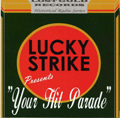
Your Hit Parade was an American radio and television music program that was broadcast from 1935 to 1953 on radio, and seen from 1950 to 1959 on television. It was sponsored by American Tobacco's Lucky Strike cigarettes. During its 24-year run, the show had 19 orchestra leaders and 52 singers or groups. Many fans inaccurately referred to the show as The Hit Parade.
WFAN is a commercial radio station licensed to New York, New York, carrying a sports radio format known as "Sports Radio 66 AM and 101.9 FM" or "The Fan". Owned by Audacy, Inc., the station serves the New York metropolitan area while its 50,000-watt clear channel signal can be heard at night throughout much of the eastern United States and Canada. WFAN's studios are located in the Hudson Square neighborhood of lower Manhattan and its transmitter is located on High Island in the Bronx. In addition to a standard analog transmission, WFAN is simulcast over WFAN-FM, and is available online via Audacy.

The Blue Network was the on-air name of a now defunct American radio network, which broadcast from 1927 through 1945.

Jessica Valentina Dragonette was a singer who became popular on American radio and was active in the World War II effort.
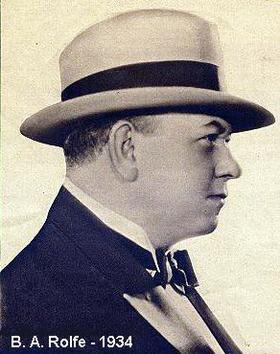
Benjamin Albert Rolfe was an American musician known as "The Boy Trumpet Wonder" who went on to be a bandleader, recording artist, radio personality, and film producer.
The A&P Gypsies is a musical series broadcast on radio beginning in 1924. With the opening theme of "Two Guitars," the host and band leader was Harry Horlick, who had learned gypsy folk music while traveling with gypsy bands in Istanbul.
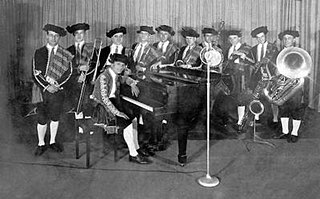
The Ipana Troubadors was a musical variety radio program which began in New York on WEAF in 1923. In actuality, the Troubadors were the Sam Lanin Orchestra. They opened the show with their theme, "Smiles."

The Clicquot Club Eskimos was a popular musical variety radio show, first heard in 1923, featuring a banjo orchestra directed by Harry Reser. A popular ginger ale, Clicquot Club, was Canada Dry's main rival. Clicquot was the name of the Eskimo boy mascot depicted in advertisements and on the product.

Acousticon Hour was a "musicale" radio program aired during 1927 and 1928 on NBC. It offered selections from classical music, orchestral favorites, operas and operettas.

The National Broadcasting Company's NBC Radio Network was an American commercial radio network which was in continuous operation from 1926 through 1999. Along with the NBC Blue Network, it was one of the first two nationwide networks established in the United States. Its major competitors were the Columbia Broadcasting System (CBS), founded in 1927, and the Mutual Broadcasting System, founded in 1934. In 1942, NBC was required to divest one of its national networks, so it sold NBC Blue, which was soon renamed the American Broadcasting Company (ABC). After this separation, the Red Network continued as the NBC Radio Network.

The Three X Sisters were an American all-girl harmony singing trio initially known as The Hamilton Sisters and Fordyce. They were on stage singing together in New York City, on Broadway, as early as 1922 and formed their trio in 1924, which was composed of Pearl Santos and Violet Hamilton from Cumberland, Maryland, and Jessie Fordyce from Brooklyn, New York. They were known on NBC radio as "radio's foremost harmony trio."

Phillips Carlin was a radio broadcaster, a radio executive, and later, a television executive.
Edgar White Burrill was an American critic and lecturer on books and the literary scene who organized the 1920s Literary Vespers series held at Aeolian Hall and Town Hall. Burrill was a major precursor to radio drama with his dramatic radio readings during the 1920s and 1930s, and one of these readings led to a milestone in broadcasting. He was a professor of English at Northwestern University.

The Eveready Hour was the first commercially sponsored variety program in the history of broadcasting. It premiered December 4, 1923, on WEAF Radio in New York City. As radio's first sponsored network program, it was paid for by the National Carbon Company, which at the time owned Eveready Battery. The host for many years was the banjo-playing vocalist Wendell Hall, "The Red Headed Music Maker", who wrote the popular "It Ain't Gonna Rain No Mo'". Hall was married on The Eveready Hour in 1924.

The Waldorf-Astoria Orchestra was an orchestra that played primarily at the Waldorf Astoria Hotel, both the old and new locations. In addition to providing dinner music at the famous hotel, the orchestra made over 300 recordings and many radio broadcasts. It was established in the 1890s, and was directed by Carlo Curti in early 1900s, Joseph Knecht at least from 1908 to 1925, later by Jack Denny and others, and then Xavier Cugat from approximately 1933 to 1949.
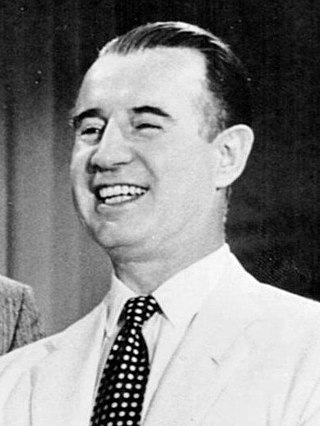
Frank Parker was an American singer and radio and television personality.

Gertrude Lightstone Mittelmann, also Gertrude Mittelmann, and Mrs. Jesse Mittelmann, was an American concert pianist. The daughter of a well-known New York surgeon, Dr. Abraham (Albert) Lightstone (1874–1955), she was one of the first women radio show hosts, notably at WQXR-AM 1550 KC. She gave one of her first American concerts at Haddon Hall in 1928. Vinyl and metal record albums were recorded of her performances as a symphonic concert pianist for various orchestras and recitals as a solo artist. In addition, many of her broadcasts as a radio host were recorded on record albums. She participated in numerous cultural and community activities.

Joseph M. Knecht was the conductor of the Waldorf-Astoria Orchestra from 1908 to 1925.
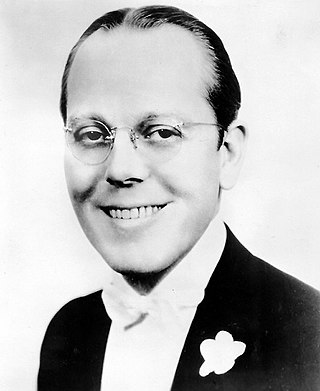
Don Bestor was an American bandleader, probably best known for directing the orchestra in the early years of The Jack Benny Program on old-time radio.
Joseph M. White was an Irish-American tenor.















